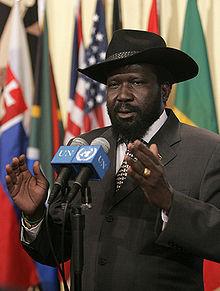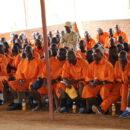Thoughts on the Juba reshuffle – By Aly Verjee


There is plenty for which Salva Kiir can be criticised, sacking his government shouldn't even be in the top twenty.
Given rumours in Juba about the authenticity of Salva Kiir’s signature on earlier presidential decrees, I couldn’t help but be curious about the five examples on the latest batch of presidential stationery. I’m happy to report that each of the chief executive’s signatures seems to have authentic, natural variation.
Other questions are less easy to answer. Is Kiir’s move really a clean sweep of old and tired faces, or will most, excepting the president’s chief irritants Riek Machar and Pagan Amum, return with new titles? (So far, the announced appointment of Barnaba Marial Benjamin as Minister of Foreign Affairs would suggest the latter.) Is the appointment of speaker of parliament James Wani Igga as chair of the committee in order to investigate Pagan’s recognition of parliamentary sovereignty or something more: a hint of a grand alliance between Kiir and Wani for 2015?
Is the reduction in the number of ministries a prelude to a new period of austerity? Could the solution to appointing deputy ministers be not to have any deputy ministers (as was the case prior to 2011)? Has Salva actually done Riek a favour by freeing him of the daily burdens of government, allowing him more time to organise his presidential bid for 2015?
I wouldn’t pretend to have firm answers to any of these questions. But amidst the largely media-driven hue and cry that this is a destabilizing crisis, remember, that with few exceptions outside of Juba, such high-level intrigues change absolutely nothing in the lives of most South Sudanese.
While there is plenty for which Salva Kiir can be criticised, sacking his government shouldn’t even be in the top twenty. Yes, the manner in which the decision was communicated was poor, and for internationals, the idea that the government is paralysed is alarming; it’s easy to forget that Juba is hardly representative of South Sudan, and South Sudan is much more than Juba.
What concerns me most about recent events is the further centralisation of power in the presidency. Whether it is Salva, Riek, Wani or someone else occupying that office in 2015 or 2016, centralising tendencies will not well serve South Sudan. That is why the greatest outrage at Kiir’s recent decrees should be reserved for those that removed elected governors in Lakes and Unity states on practically flimsy and constitutionally dubious grounds. Chol Tong and Taban Deng were far from perfect; but Juba may not make anything better by setting a precedent of interference.
The South Sudanese state, for what it is, exists most immediately not at the ministerial complex in Juba, but at the local level in Rumbek, in Yambio, in Bentiu, at the counties, and with the chiefs. That’s where governance – limited though it may be – happens in today’s South Sudan.
This does not mean the composition of the next government does not matter. The longer it takes for Kiir to put a cabinet together the more likely a government of accommodation, rather than of action, emerges. But the real political drama is still to come: the next meeting of the SPLM political bureau and, eventually, the party convention.
Aly Verjee is senior researcher at the Rift Valley Institute.






